What is air cargo insurance? Undoubtedly, in an increasingly globalized economy, the transportation of goods via air freight has become a cornerstone of international trade, offering unparalleled speed and efficiency in connecting markets across continents. However, with the skies bridging vast distances over varied terrains and through diverse climatic conditions, the journey of goods from one corner of the globe to another is fraught with uncertainties.

From turbulence and adverse weather to mechanical failures and logistical errors, the risks are manifold. This is where air cargo insurance steps into the fray, serving as a critical safeguard against the unpredictable and ensuring that businesses can operate with confidence and resilience.
What is Air Cargo Insurance?
Air cargo insurance provides financial protection against the loss, damage, or theft of goods while they are being transported by air. It is designed to reduce the risks associated with air freight, which can be everything from handling errors to mechanical failures and weather events.
This type of insurance is important for businesses that engage in international trade, making sure that the value of their goods is protected throughout the journey.
Types of Air Cargo Insurance
There are two main types of insurance, which you will be learning about below, so keep reading:
- Land Cargo Insurance.
- Marine Cargo Insurance.
Land Cargo Insurance
Land cargo insurance provides coverage for goods transported over land, primarily by trucks and trains. This type of insurance is crucial for businesses that rely on ground transportation to move products domestically or to ports for international shipping.
Coverage typically includes protection against theft, loss, or damage due to accidents, natural disasters, and sometimes strikes, riots, and civil commotion. Policies can vary greatly depending on the carrier, the nature of the goods transported, and the specific routes taken.
Marine cargo insurance
Marine Cargo Insurance covers goods transported over sea, including international shipping routes. This insurance is vital for protecting against the myriad risks associated with sea freight. Such as weather hazards, piracy, and accidents during loading or unloading.
Marine cargo insurance policies are often complex, reflecting the intricate nature of maritime logistics and the international regulations governing sea transportation.
How Does it Work?
When goods are safeguarded by air cargo insurance, the insurance provider commits to reimbursing either the sender or the recipient for any damages or losses that are encompassed by the policy’s terms. Should there arise a need to make a claim, it falls upon the insured to submit evidence of the incurred loss or damage.
Subsequently, the insurance company undertakes a thorough evaluation of the claim. Then, upon determining its legitimacy, proceeds to allocate compensation by the stipulations outlined in the insurance agreement.
What Does Air Cargo Insurance Cover?
Air cargo insurance policies can vary, but typically they offer coverage for:
- Damage to goods, including physical damage from handling, weather conditions, or accidents.
- Loss of goods, including theft, non-delivery, or misrouting.
- General Average: contributions required in maritime law if the ship and cargo must be intentionally sacrificed to save the whole venture.
- War and Strikes: risks associated with warlike activities, strikes, riots, and civil commotions (usually as additional coverage).
- Customs Rejection: costs associated with the rejection of goods by customs authorities.
- Cargo abandonment: costs involved in abandoning cargo.
- Transshipment costs are additional costs if goods need to be transferred to another vessel or mode of transport due to unforeseen circumstances.
What Does It Not Cover?
While comprehensive air cargo insurance does not cover everything, here are what the exclusions typically include:
- Improper packing: losses due to inadequately prepared or secured goods.
- Inherent vice: damage resulting from the natural behavior of certain goods.
- Delay: financial losses due to delivery delays.
- Market loss: loss of market value or market opportunity.
- Illegal or Prohibited Items: goods that are illegal or prohibited from transport.
- Willful misconduct: losses resulting from intentional acts or negligence by the insured party.
How Much Does Air Cargo Insurance Cost?
The cost of air cargo insurance can differ depending on multiple factors. For example, consider the value of the goods, the route taken, the type of goods being transported, and the level of coverage desired. Generally, rates are calculated as a percentage of the declared value of the cargo, often ranging from 0.1% to 2%.
How to Get Air Cargo Insurance
Getting air cargo insurance involves a straightforward process, often customizable to fit the specific needs and preferences of shippers. Here is a simple list of steps to acquire air cargo insurance:
- Evaluate your shipping and insurance needs.
- Consult with a reputable insurance broker or agent.
- Obtain quotes from different insurers.
- Review the terms and coverage options.
- Select a policy that meets your requirements.
- Complete the application process.
- Pay the premium to activate the coverage.
When you complete the last step, you will be able to file a claim whenever you want and receive protection from your policy as well.
Frequently Asked Questions
Does air cargo insurance cover the entire journey of the goods?
This depends on the terms of the policy. Some policies may offer door-to-door coverage, while others may cover only the air transport segment.
Is air cargo insurance required by law?
No, it is not legally required but highly recommended for the protection of your goods.
Can I insure any type of goods?
Most types of goods can be insured, but coverage and rates may vary depending on the risk associated with the specific goods.
How do I file a claim?
In the event of loss or damage, contact your insurer as soon as possible to begin the claims process, providing all necessary documentation and evidence of the loss.
